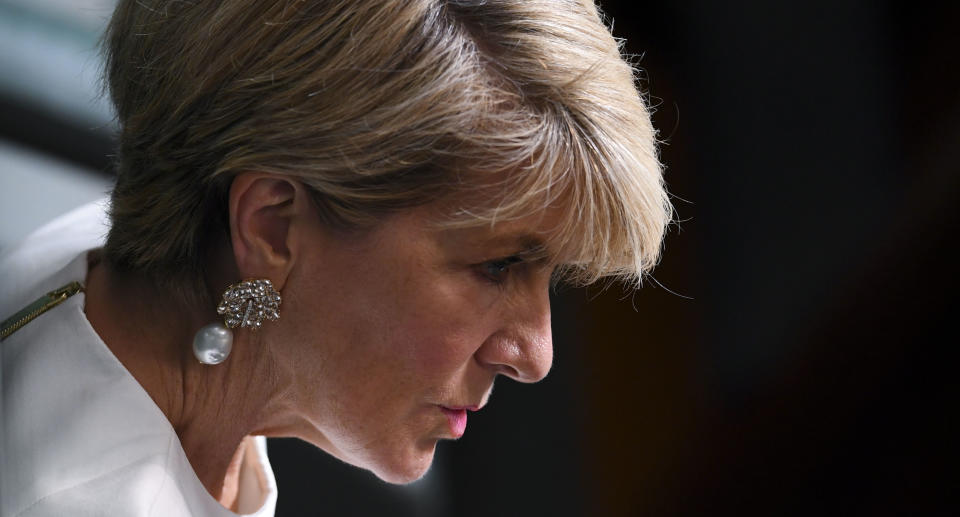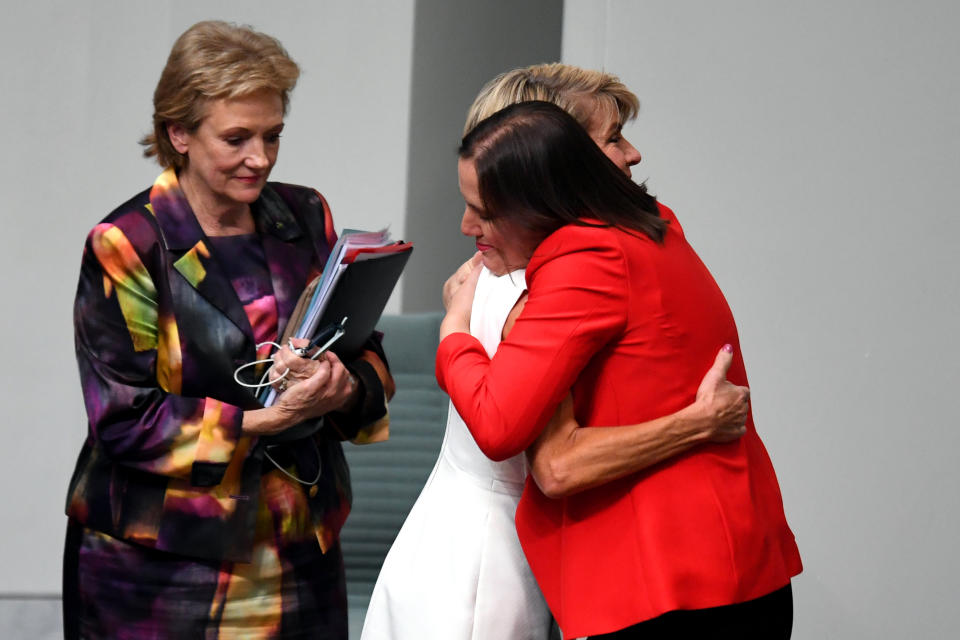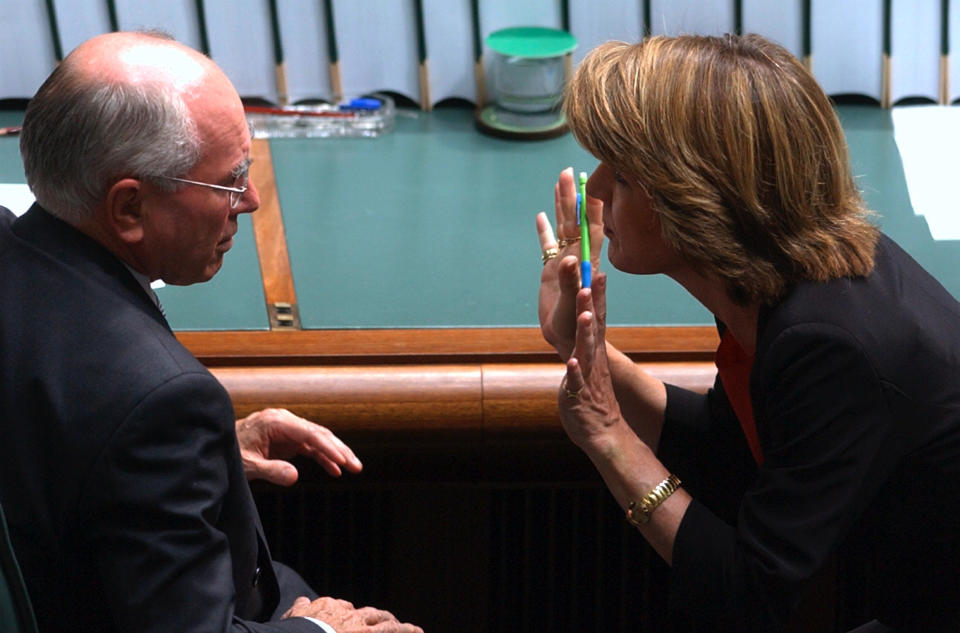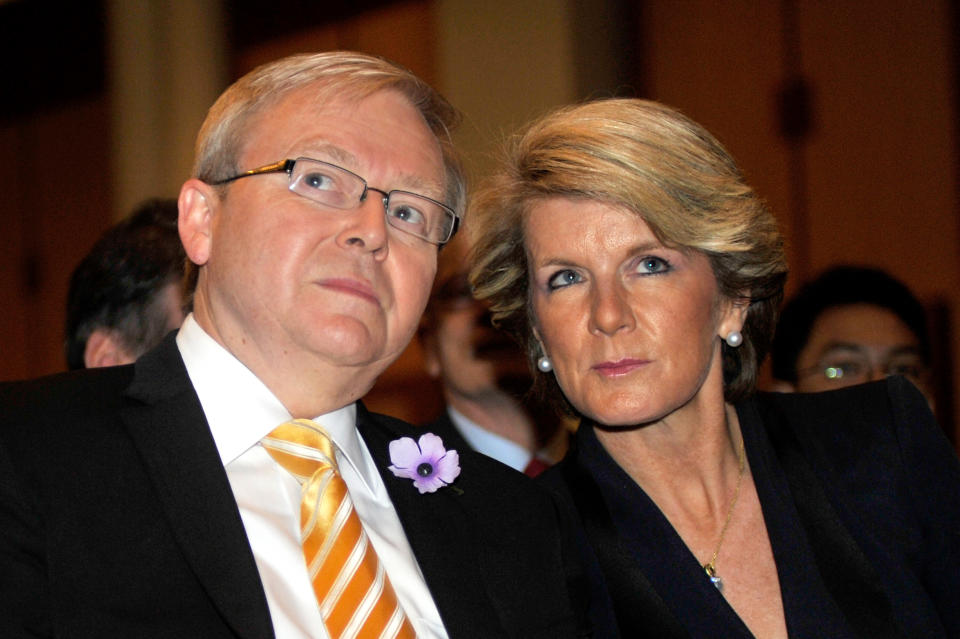Julie Bishop to retire from politics
Former foreign minister Julie Bishop is retiring from parliament after two decades in politics.
“I will not re-contest the seat of Curtin at the next election,” she said on Thursday, declaring she believed the government would win the coming poll.
Ms Bishop said a number of “extraordinarily talented” people, including women, had contacted her about running in the West Australian seat if she decided to stand down.
“I will work hard in the meantime to assist a new Liberal candidate to win the seat,” she said.
“It is time for a new member to take my place.”

She thanked the prime ministers who chose her to serve as a minister – John Howard, Tony Abbott and Malcolm Turnbull.
The 62-year-old also paid tribute to Senator Marise Payne as incoming foreign minister adding she was “very proud” of her.
Ms Payne choked back tears as she said Australia should be proud of its high status in the international community.

“It is in no small measure attributable to her leadership, her drive, and her commitment as Australia’s foreign minister for five years that that is the case,” Senator Payne told a Senate estimates hearing.
“Many have contributed in the past, but in recent times, her personal leadership has made an enormous contribution to that standing.”
Ms Bishop has been an MP since 1998, and was Australia’s first female foreign minister and deputy Liberal leader.
Prime Minister Scott Morrison thanked Ms Bishop and tweeted whoever replaces her “will have big shoes to fill”.

‘A giant of the Liberal Party’
In a statement, he said Ms Bishop is “a is a giant of the Liberal Party and she has been a ground breaker for women in public life”.
“Julie has been a good friend,” Mr Morrison said.
“I have valued her judgement, appreciated her insight and admired the tireless way she has served the Party, the Parliament and Australia.
“On behalf of the Government and the Liberal Party, I thank Julie for her great service to Australia for nearly two decades.”
The prime minister added “was one of Australia’s truly great foreign ministers”.
He praised her efforts in dealing with Malaysia Airlines flight MH17 disaster in 2014, when 38 Australians were killed.

Opposition Leader Bill Shorten said Ms Bishop had been a “trailblazer” in her roles in foreign affairs and as deputy Liberal leader.
He also thanked her for the way she fought for the families of the MH17 victims on the world stage.
“She did Australia proud that day and in those weeks,” Mr Shorten said.
He said he hoped to see her stay in public life.
Former prime minister Malcolm Turnbull said Ms Bishop has been Australia’s “finest foreign minister” and called her “eloquent, elegant and always courageous”.
Failed leadership bid
She served as deputy to three leaders, watching from close proximity as each copped the knife.
But it was never Ms Bishop bearing the fruits of the killing by stepping into the outgoing leader’s shoes.
In August 2018, after a turbulent week in the Liberal Party that concluded with the end of Malcolm Turnbull’s prime ministership, she tried for the top job.
But she fell well short, winning only 11 votes – including her own – in the partyroom vote of 85 MPs.
Thank you @JulieBishopMP for your 20+ years service to Australia, as a MP and Minister, and to the Liberal Party. You’ve been a star of the @LiberalAus team and we wish you all the best. pic.twitter.com/nWsgpJEfbU
— Scott Morrison (@ScottMorrisonMP) February 21, 2019
It emerged that she never had a hope, with her own moderate faction urging each other to put their votes behind Scott Morrison to stop Peter Dutton becoming prime minister.
Her 20-year career in federal politics will end when the next general election is called.
Now 62, she entered parliament at the 1998 election as Perth’s member for Curtin and it’s where she opted to stay.
It was in the Howard government in 2003 that Bishop joined the front bench as aged care minister.
Julie Bishop after her election to Parliament, 1998 pic.twitter.com/dco8kqQo0h
— Canberra Insider (@CanberraInsider) February 21, 2019
John Howard rewarded her with the education portfolio and made her responsible for women’s issues in 2006 but it was short-lived, with the government falling in the November 2007 ‘Ruddslide’.
She was elected deputy Liberal leader under opposition leader Brendan Nelson after the 2007 poll and was handed the shadow employment and workplace relations role.
When Mr Nelson’s leadership imploded 11 months later she remained deputy under Malcolm Turnbull and took on the shadow treasury role.
Widely considered a failure in the portfolio, she stepped aside months later and shifted to foreign affairs – a job in which she thrived.
Incoming leader Tony Abbott kept her by his side after his one-vote partyroom win over Mr Turnbull in December 2009 and she kept the portfolio after Labor scraped into minority government in 2010.
Thank you @JulieBishopMP for your service to our nation and our Party and, above all, your friendship over so many years. You have been our finest Foreign Minister – eloquent, elegant and always courageous advancing our national interest in these challenging times.
— Malcolm Turnbull (@TurnbullMalcolm) February 21, 2019
As Mr Abbott shunted the train wreck that was federal Labor in 2013, Australia’s first female foreign minister faced some tough challenges.
But she reaped the benefits of Labor’s lobbying for a United Nations Security Council seat, making the most of it to tackle issues including Iran, Islamic State’s rise in Iraq and Syria and shaming Russia over the MH17 tragedy.
The families of the Malaysian Airline disaster victims appreciated her deep and ongoing interest and sympathetic response.
She undoubtedly played a key role in healing the damage caused to relations with Indonesia by Labor’s live cattle debacle, boat turn backs as well as the Indonesian president phone tapping scandal.

At times, her profile put her ahead of Mr Turnbull in the popularity stakes.
In a March 2017 poll by Roy Morgan, 30 per cent of people surveyed said she was their preferred Liberal Party leader, compared to 27 per cent for Mr Turnbull and 5 per cent for Dutton.
Asked in 2013 if she could withstand several terms of government as foreign minister, the reportedly indefatigable Ms Bishop was unwavering.
“Absolutely,” she said without a moment’s hesitation.
“You have to have inexhaustible supplies of energy to be a federal politician from Western Australia anyway.”
With AAP


